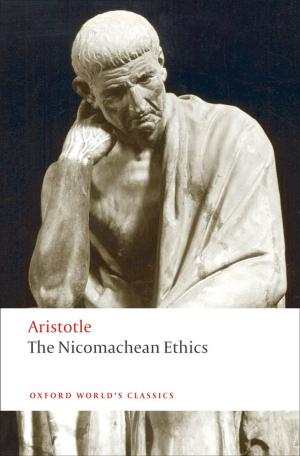The Quest for the Good Life
Ancient Philosophers on Happiness
Nonfiction, Religion & Spirituality, Philosophy, Ancient, Ethics & Moral Philosophy| Author: | ISBN: | 9780191064029 | |
| Publisher: | OUP Oxford | Publication: | October 8, 2015 |
| Imprint: | OUP Oxford | Language: | English |
| Author: | |
| ISBN: | 9780191064029 |
| Publisher: | OUP Oxford |
| Publication: | October 8, 2015 |
| Imprint: | OUP Oxford |
| Language: | English |
How should I live? How can I be happy? What is happiness, really? These are perennial questions, which in recent times have become the object of diverse kinds of academic research. Ancient philosophers placed happiness at the centre of their thought, and we can trace the topic through nearly a millennium. While the centrality of the notion of happiness in ancient ethics is well known, this book is unique in that it focuses directly on this notion, as it appears in the ancient texts. Fourteen papers by an international team of scholars map the various approaches and conceptions found from the Pre-Socratics through Plato, Aristotle, Hellenistic Philosophy, to the Neo-Platonists and Augustine in late antiquity. While not promising a formula that can guarantee a greater share in happiness to the reader, the book addresses questions raised by ancient thinkers that are still of deep concern to many people today: Do I have to be a morally good person in order to be happy? Are there purely external criteria for happiness such as success according to received social norms or is happiness merely a matter of an internal state of the person? How is happiness related to the stages of life and generally to time? In this book the reader will find an informed discussion of these and many other questions relating to happiness.
How should I live? How can I be happy? What is happiness, really? These are perennial questions, which in recent times have become the object of diverse kinds of academic research. Ancient philosophers placed happiness at the centre of their thought, and we can trace the topic through nearly a millennium. While the centrality of the notion of happiness in ancient ethics is well known, this book is unique in that it focuses directly on this notion, as it appears in the ancient texts. Fourteen papers by an international team of scholars map the various approaches and conceptions found from the Pre-Socratics through Plato, Aristotle, Hellenistic Philosophy, to the Neo-Platonists and Augustine in late antiquity. While not promising a formula that can guarantee a greater share in happiness to the reader, the book addresses questions raised by ancient thinkers that are still of deep concern to many people today: Do I have to be a morally good person in order to be happy? Are there purely external criteria for happiness such as success according to received social norms or is happiness merely a matter of an internal state of the person? How is happiness related to the stages of life and generally to time? In this book the reader will find an informed discussion of these and many other questions relating to happiness.















